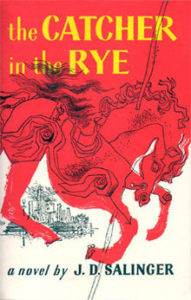Jerome David Salinger, the man the New York Times
once described as having “elevated privacy to an art form,” passed away
nine years ago this week. At the time of his death, despite not having
published a book in almost fifty years, Salinger was still a (literary)
household name. There were a number of bizarre but undeniably
fascinating reasons for this, chief among them his almost mythic
sustained reclusiveness and the enduring popularity of his now-canonical
1951 debut, The Catcher in the Rye (which has now sold
somewhere in the region of 70 million copies worldwide). There was also
his early romance with Eugene O’Neill’s daughter, Oona (who ghosted him for Charlie Chaplin); the intense legal dispute with biographer Ian Hamilton, which culminated in Salinger suing Random House;
a relationship with eighteen-year-old journalist Joyce Maynard when he
was fifty-three; two revealing memoirs published within a year of each
other at the close of the 90s—one by Maynard and another by Salinger’s
daughter, Margaret; and the ongoing speculation that his aberrant
behavior stemmed from his WWII service and the resultant, untreated, PTSD.
Those, however, are just just the scandals and headlines. What, you
may ask, of the writing? What about the book many consider to be the
greatest American novel of the post-war era? Or the dozen New Yorker
stories that have influenced scores of beloved writers, from Richard
Yates to John Green? Well, below you’ll find a selection of the first
reviews of each of Salinger’s published books, from the all-powerful Catcher to Three Early Stories (the somewhat controversial publication of which, in 2014, probably would have displeased the author).
The Catcher in the Rye (1951)
I was surrounded by phonies…They were coming in the goddam window.
“Holden’s story is told in Holden’s own strange, wonderful language by J. D. Salinger in an unusually brilliant novel… Holden
is bewildered, lonely, ludicrous and pitiful. His troubles, his
failings are not of his own making but of a world that is out of joint.
There is nothing wrong with him that a little understanding and
affection, preferably from his parents, couldn’t have set right. Though
confused and unsure of himself, like most 16-year-olds, he is observant
and perceptive and filled with a certain wisdom. His minor delinquencies
seem minor indeed when contrasted with adult delinquencies with which
he is confronted.
Mr. Salinger, whose work has appeared in The New Yorker and
elsewhere, tells a story well, in this case under the special
difficulties of casting it in the form of Holden’s first-person
narrative. This was a perilous undertaking, but one that has been
successfully achieved. Mr. Salinger’s rendering of teen-age speech is
wonderful: the unconscious humor, the repetitions, the slang and
profanity, the emphasis, all are just right. Holden’s mercurial changes
of mood, his stubborn refusal to admit his own sensitiveness and
emotions, his cheerful disregard of what is sometimes known as reality
are typically and heart breakingly adolescent.”

Keine Kommentare:
Kommentar veröffentlichen